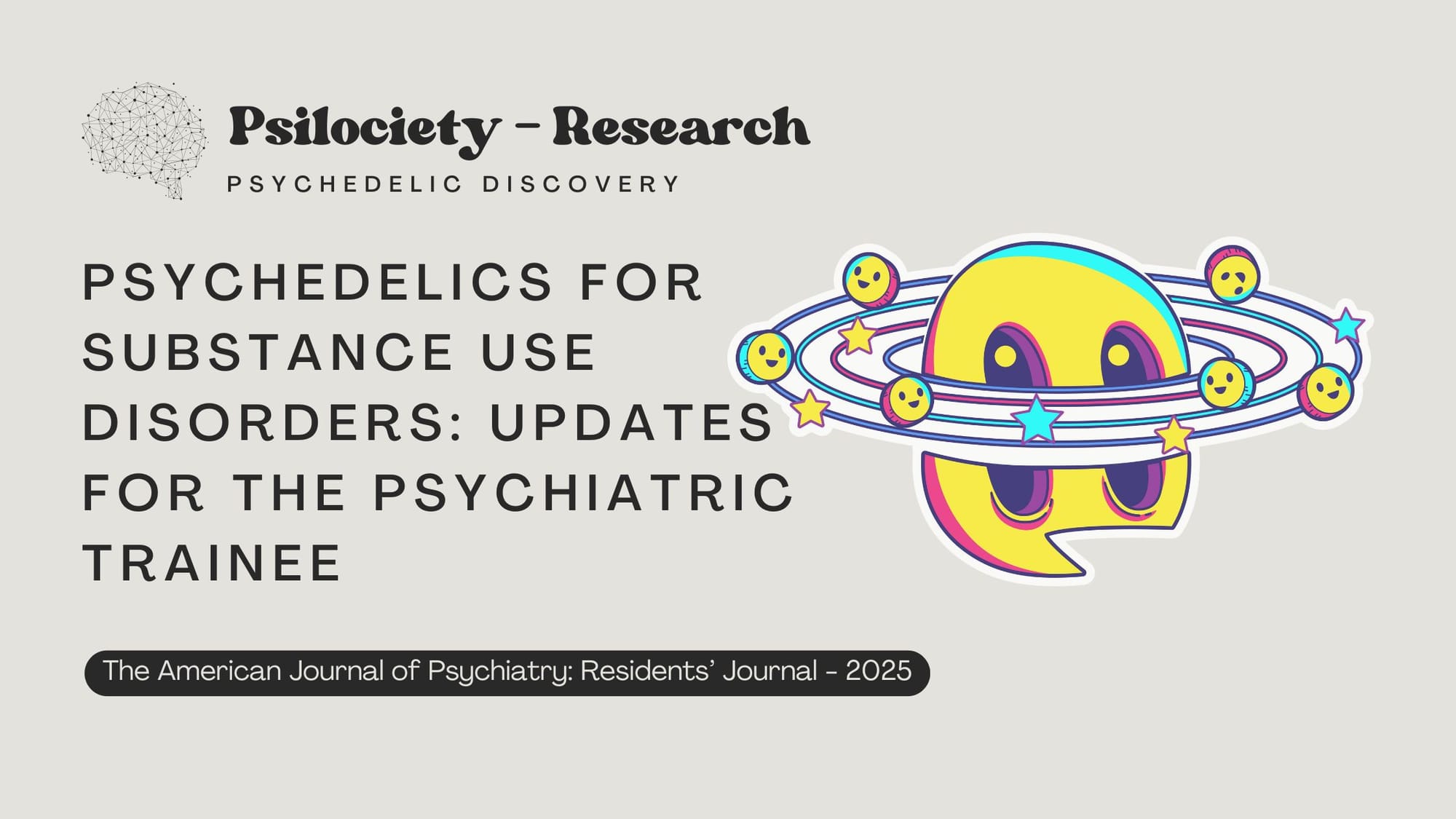Psychedelics for Substance Use Disorders: Updates for the Psychiatric Trainee
A review of psychedelics as emerging treatments for substance use disorders, discussing efficacy, safety, and key research findings.

Title & Introduction
- Paper Title: Psychedelics for Substance Use Disorders: Updates for the Psychiatric Trainee
- Published In: The American Journal of Psychiatry Residents’ Journal
- Publish date: March 6, 2025
- Authors: Lauren Wilseck, D.O., M.P.H., Preet Chatha, B.S., Lawrence Canale, B.S., Dhvanit Raval, B.S., Jeremy Weleff, D.O.
- Objective: To critically evaluate the literature on the use of psychedelics for substance use disorders (SUDs), exploring their efficacy, safety, and risks.
- Importance: Given the increasing burden of substance use disorders and the limitations of current treatments, psychedelics offer a novel pharmacological approach to managing addiction.
Summary & Takeaways
Key Takeaway: Emerging research suggests that serotonergic psychedelics, such as LSD and psilocybin, may offer therapeutic benefits in reducing substance use and cravings in individuals with SUDs.
Practical Application: Psychedelic-assisted therapy could be integrated into addiction treatment programs, particularly for alcohol and tobacco use disorder, provided further clinical validation confirms safety and efficacy.
Key Background Information
- Context: Substance use disorders are a major public health issue, with rising mortality rates from alcohol and drug-related causes. Traditional treatment approaches, such as pharmacotherapy and behavioral interventions, often yield limited long-term success.
- Hypothesis: Serotonergic psychedelics exert therapeutic effects on SUDs by modulating neural circuits related to addiction, enhancing neuroplasticity, and disrupting maladaptive behavioral patterns.
Methodology
- Study Design: Narrative review of clinical and preclinical studies on psychedelic-assisted therapy for substance use disorders.
- Participants: Review includes data from various studies on individuals with alcohol, tobacco, and opioid use disorders.
- Intervention/Exposure: Treatment with serotonergic psychedelics such as psilocybin, LSD, and ibogaine.
- Controls: Some reviewed studies included placebo or standard treatment comparisons.
- Duration: Studies reviewed included both short-term and long-term follow-ups on psychedelic treatment effects.
Key Findings
Primary Outcomes:
- LSD has shown promise in increasing alcohol abstinence rates in early clinical trials.
- Psilocybin has demonstrated efficacy in reducing tobacco and alcohol dependence.
- Ibogaine has potential in opioid use disorder treatment but presents safety concerns.
Secondary Outcomes:
- Psychedelics enhance neuroplasticity, potentially aiding behavioral change.
- Patients report reduced cravings and greater motivation for abstinence post-treatment.
- Psychological insights gained during psychedelic experiences may contribute to long-term recovery.
Interpretation & Implications
- Conclusion: Psychedelics may offer an effective alternative or adjunctive treatment for substance use disorders, but further research is required to determine long-term safety and efficacy.
- Implications: The resurgence of psychedelic research may lead to novel addiction treatments, particularly in patients with treatment-resistant SUDs.
- Limitations: Many studies are small-scale and lack rigorous controls; more randomized controlled trials are needed.
Researchers & Publication
- Researchers: Lauren Wilseck, Preet Chatha, Lawrence Canale, Dhvanit Raval, Jeremy Weleff
- Publication Name: The American Journal of Psychiatry Residents’ Journal
- Study URL: https://doi.org/10.1176/appi.ajp-rj.2025.200301

